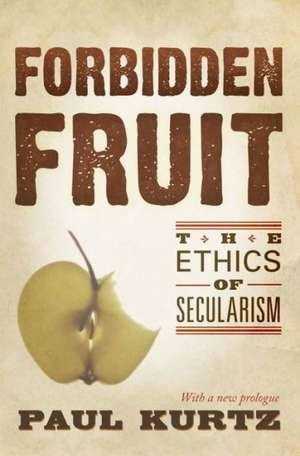Forbidden Fruit
Autor Paul Kurtzen Limba Engleză Hardback – mar 1988
Preț: 223.35 lei
Nou
Puncte Express: 335
Preț estimativ în valută:
42.74€ • 44.74$ • 35.36£
42.74€ • 44.74$ • 35.36£
Carte disponibilă
Livrare economică 17-31 martie
Preluare comenzi: 021 569.72.76
Specificații
ISBN-13: 9780879754549
ISBN-10: 0879754540
Pagini: 264
Dimensiuni: 157 x 235 x 20 mm
Greutate: 0.6 kg
Editura: Prometheus
ISBN-10: 0879754540
Pagini: 264
Dimensiuni: 157 x 235 x 20 mm
Greutate: 0.6 kg
Editura: Prometheus
Notă biografică
Paul Kurtz (1925-2012), professor emeritus of philosophy at the State University of New York at Buffalo and a fellow of the American Association for the Advancement of Science, was the author or editor of more than fifty books, including The Transcendental Temptation, The Courage to Become, and Embracing the Power of Humanism, plus nine hundred articles and reviews. He was the founder and chairman of the Center for Inquiry, the Council for Secular Humanism, and the Committee for Skeptical Inquiry. He appeared on many major television and radio talk shows and has lectured at universities worldwide.
Recenzii
"An appropriate challenge to current trends in religion and politics."
- Booklist
"The basic message of this book is that secular humanism is reasonable because it does not involve any superstitions; it is practicable because it coincides with common decency; and it promotes harmony because it does not divide society into pure us and evil them.
"Kurtz's arguments are so cogent, his definitions so clear, and his examples so close to everyday life, that this book could be used as a textbook in introductory ethics courses wherever state and church are separate."
- Mario Bunge, FRSC, Frothingham Professor of Logic and Metaphysics, McGill University, Montreal, Canada
- Booklist
"The basic message of this book is that secular humanism is reasonable because it does not involve any superstitions; it is practicable because it coincides with common decency; and it promotes harmony because it does not divide society into pure us and evil them.
"Kurtz's arguments are so cogent, his definitions so clear, and his examples so close to everyday life, that this book could be used as a textbook in introductory ethics courses wherever state and church are separate."
- Mario Bunge, FRSC, Frothingham Professor of Logic and Metaphysics, McGill University, Montreal, Canada
